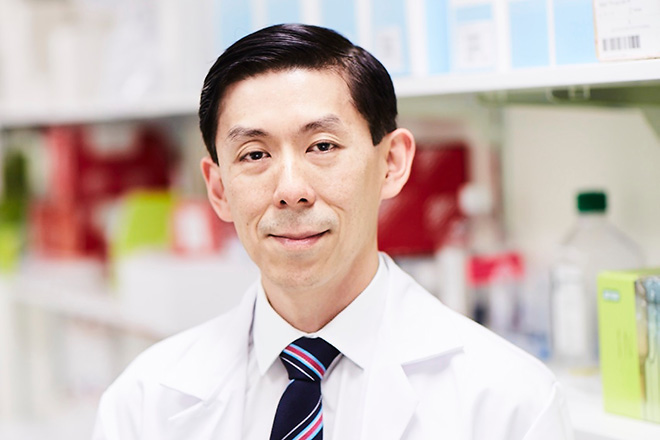
Associate Professor Hui Gan
An up-and-coming group of anti-cancer drugs has shown promising signs in a recent study, increasing the chance of kinder and more effective therapies for bowel and breast cancer patients.
Led by Associate Professor Hui Gan, the research showed that these new drugs were effective in many strains of breast and bowel cancers, potentially opening the way for people affected by these cancers to have a greater range of treatments into the future.
A/Prof Gan says this research, funded by kind supporters of Cancer Council Victoria, is an encouraging early step in a broader field of study – which could have far-reaching impacts for people affected by various cancers.
“This research is necessary if these drugs are to move into human testing,” A/Prof Gan said. “It is the vital first step in their translation from the laboratory to the clinic. This could lead to a new class of drugs for patients with breast and colon cancer.”
A/Prof Gan’s project investigated the use of a sophisticated type of drug called antibody–drug conjugates (ADCs). These ADCs comprise an antibody, which acts like a homing device to target cancer cells, and a payload – a very strong anti-cancer drug.
“The ADC homes in on the cancer, penetrates the cell and delivers the payload into the cancer cell only,” A/Prof Gan said. “In this way, we can get increased benefit and less side-effects.”
The ADCs that A/Prof Gan is testing targeted cancer cells expressing a protein called EGFR, or Epidermal Growth Factor Receptor.
With the drugs having shown very promising signs in patients affected by glioblastoma – a deadly type of brain tumour – A/Prof Gan hopes they can be similarly successful in meeting another urgent need.
“Although patients with breast and colon cancer have good survival and are often cured if diagnosed at early stages, patients with metastatic disease still have poor survival,” A/Prof Gan said.
“Furthermore, conventional drugs often have significant side effects. New and better drugs are required, and ADCs are a new class of drugs that have shown promise.”
Your support of this research could have a huge impact on Victorians affected by cancer.
Breast and bowel cancer are the second- and third-most common cancers in Victoria, respectively. 647 people in Victoria sadly died of bowel cancer in 2018, while breast cancer takes the lives of more than 700 women in Victoria each year and accounts for 29% of cancer cases in women.
But thanks to your support, things are getting better every year.
Breast cancer mortality rates have been decreasing by approximately 2% every year since 1994, while mammographic screening has seen up to a 28% reduction in breast cancer risk for women aged 50–69.
Similarly, more than 90% of bowel cancer incidences can be treated successfully if caught early. Since the full implementation of the National Bowel Screening Program in 2014, participation has risen to 41%, saving hundreds of lives – and experts say that if participation rises to 60%, an incredible 84,000 lives could be saved by 2040.
A/Prof Gan’s research into ADCs is an encouraging addition to these other measures which seek to see fewer lives lost to cancer into the future – and there is still plenty of work to be done on these exciting new drugs.
“We continue to investigate the reasons why some cancers are sensitive and not others, and how this information can be used to select patients most likely to benefit from these drugs,” A/Prof Gan said.
“This research will allow us to rationally plan the best possible trials for patients with colon and breast cancer who might benefit from these anti-EGFR targeting drugs.”
A/Prof Gan also hopes that the benefits of these drugs can be expanded well beyond just these types of cancer.
“As EGFR is found in most cancers, this class of drugs has the potential to help patients with a range of cancer types. Our work with colon and breast is the start of this broader development program,” he said.
‘In five years, I hope that cancer patients will have access to better drugs which will specifically target their cancer effective and with minimal side effects. This will be achieved by better understanding cancer biology and targeting cancer specific proteins.”
This crucial research couldn’t happen without your support. Thank you for making this possible.
See more ground-breaking cancer research you’re supporting!